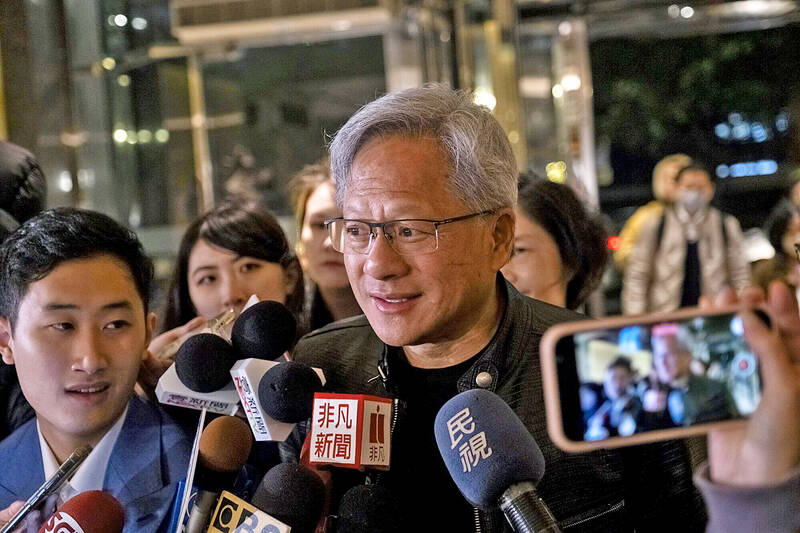Nvidia Corp chief executive officer Jensen Huang (黃仁勳) met with his counterpart at Taiwan Semiconductor Manufacturing Co (TSMC, 台積電) this week to discuss artificial intelligence (AI) chip supply constraints, a major challenge to the AI boom that got going last year.
The heads of the world’s two most valuable chip firms met in Taipei over dinner to discuss the Taiwanese firm’s role as producer of the Nvidia chips that power the majority of generative AI training systems worldwide, Huang told reporters in Taipei.
TSMC founder and prominent industry figure Morris Chang (張忠謀) also joined Huang’s dinner with CEO C.C. Wei (魏哲家) on Wednesday.

Photo: Bloomberg
Huang arrived in Taipei days after embarking on his first visit to China in four years, at a time when the US bars the shipment of Nvidia’s highest-end chips to a geopolitical rival.
While Nvidia has said little about that low-profile tour, Huang talked openly on Thursday about Taiwan’s and TSMC’s pivotal role in Nvidia’s business as well as the broader semiconductor sector.
“The single greatest challenge in AI, of course, is scaling the capacity of AI,” Huang said before heading into his company’s local Lunar New Year celebrations.
“We’re working very hard, TSMC, all of our supply chain partners here, are working very hard to keep up with the demand,” Huang said.
“This year is going to be a huge year,” he added.
EXPORT CONTROLS
Huang declined to answer questions about its China business. The Nvidia chief has previously warned that an escalation in US sanctions, designed to staunch the flow of AI training chips to China, could drive local firms to develop their own alternatives. That could harm US tech leaders in the long run.
The billionaire has name-checked Huawei Technologies Co (華為) — which last year alarmed Washington by including an advanced made-in-China processor in a smartphone — as a potential rival.
Nvidia, which more than tripled its market value last year thanks largely to its pivotal role in AI development, is up another 24 percent this year as investors bet on its sector leadership. It has designed versions of its semiconductors for China that it says are compliant with US restrictions.
The AI boom is helping prop up TSMC’s business. Last week, the company projected a potential rise in capital spending and robust revenue growth, helping trigger a sector-wide stock rally.
Huang on Thursday acknowledged the nation’s most critical industry.
“It’s a rebirth of the computer industry and that’s why Taiwan is so central to that,” he said.
“TSMC, the ecosystem of Taiwan system makers are all going to participate in this new era of computing,” he added.

SETBACK: Apple’s India iPhone push has been disrupted after Foxconn recalled hundreds of Chinese engineers, amid Beijing’s attempts to curb tech transfers Apple Inc assembly partner Hon Hai Precision Industry Co (鴻海精密), also known internationally as Foxconn Technology Group (富士康科技集團), has recalled about 300 Chinese engineers from a factory in India, the latest setback for the iPhone maker’s push to rapidly expand in the country. The extraction of Chinese workers from the factory of Yuzhan Technology (India) Private Ltd, a Hon Hai component unit, in southern Tamil Nadu state, is the second such move in a few months. The company has started flying in Taiwanese engineers to replace staff leaving, people familiar with the matter said, asking not to be named, as the

The prices of gasoline and diesel at domestic fuel stations are to rise NT$0.1 and NT$0.4 per liter this week respectively, after international crude oil prices rose last week, CPC Corp, Taiwan (台灣中油) and Formosa Petrochemical Corp (台塑石化) announced yesterday. Effective today, gasoline prices at CPC and Formosa stations are to rise to NT$27.3, NT$28.8 and NT$30.8 per liter for 92, 95 and 98-octane unleaded gasoline respectively, the companies said in separate statements. The price of premium diesel is to rise to NT$26.2 per liter at CPC stations and NT$26 at Formosa pumps, they said. The announcements came after international crude oil prices

SinoPac Financial Holdings Co (永豐金控) is weighing whether to add a life insurance business to its portfolio, but would tread cautiously after completing three acquisitions in quick succession, president Stanley Chu (朱士廷) said yesterday. “We are carefully considering whether life insurance should play a role in SinoPac’s business map,” Chu told reporters ahead of an earnings conference. “Our priority is to ensure the success of the deals we have already made, even though we are tracking some possible targets.” Local media have reported that Mercuries Life Insurance Co (三商美邦人壽), which is seeking buyers amid financial strains, has invited three financial

CAUTION: Right now, artificial intelligence runs on faith, not productivity and eventually, the risk of a bubble will emerge,’ TIER economist Gordon Sun said Taiwanese manufacturers turned more optimistic last month, ending a five-month streak of declining sentiment as concerns over US tariffs, currency volatility and China’s overcapacity began to ease, the Taiwan Institute of Economic Research (TIER) said yesterday. The manufacturing business confidence index rose 1.17 points from June to 86.8, its first rebound since February. TIER economist Gordon Sun (孫明德) attributed the uptick to fading trade uncertainties, a steadier New Taiwan dollar and reduced competitive pressure from Chinese producers. Taiwan’s semiconductor industry is unlikely to face significant damage from Washington’s ongoing probe into semiconductors, given the US’ reliance on Taiwanese chips to power artificial